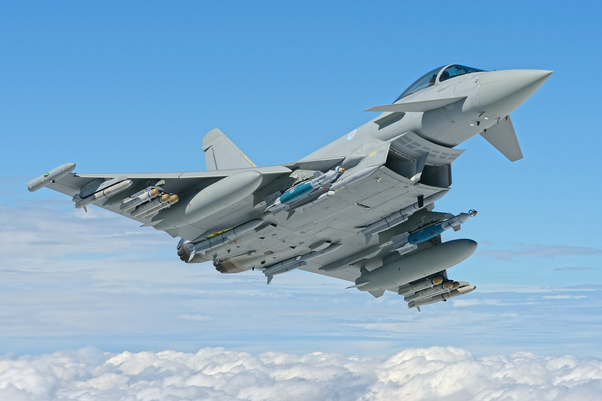Chancellor Olaf Scholz’s government has defended its plans to end Germany’s longstanding veto on selling Eurofighter jets to Saudi Arabia.
The move comes as the Saudi government has been perceived to adopt a “constructive approach” during the Israel-Hamas conflict, according to German officials.
Germany, Britain, Italy, and Spain collaboratively manufacture the Eurofighter jet, and each participating country can veto potential deals.
Berlin has maintained a veto since 2018, blocking a deal sought by London. However, German Foreign Minister Annalena Baerbock signalled a shift in Germany’s stance during her recent visit to Israel, suggesting that the blockade might be lifted.
The decision to reconsider the veto has sparked debate and raised questions about the implications of selling military aircraft to Saudi Arabia, particularly in the context of the ongoing conflict in the Middle East.
The Israel-Hamas war has been a focal point for nations assessing their diplomatic relations and arms sales policies.
The German government, in its defence of the potential policy change, points to what it describes as a “constructive approach” taken by Riyadh amid the Israel-Hamas conflict.
This claim suggests that German officials have viewed Saudi Arabia’s role in the region positively, potentially influencing their decision to lift the veto on Eurofighter jet sales.
The Eurofighter jet, a product of joint efforts by the four European nations, is a state-of-the-art military aircraft known for its advanced capabilities.
The decision to allow its sale to Saudi Arabia involves political, diplomatic, and ethical considerations.
Germany’s reassessment of its position raises questions about the delicate balance between economic interests, regional stability, and human rights concerns.
Critics of the potential policy change argue that selling advanced military equipment to Saudi Arabia could have far-reaching consequences in the Middle East and beyond.
Concerns include the impact of the ongoing conflict in Yemen, where Saudi Arabia is involved, as well as the broader question of arms sales contributing to instability in the region.
On the other hand, proponents of lifting the veto emphasize the need for diplomatic engagement and the potential positive influence of such arms deals on Saudi Arabia’s behaviour in the region.
They argue that fostering dialogue through economic cooperation may lead to a more constructive role for Saudi Arabia in addressing regional conflicts.
As Germany navigates this delicate diplomatic terrain, the international community watches closely.
The potential shift in Germany’s position on Eurofighter jet sales to Saudi Arabia underscores the complex interplay between geopolitics, arms trade, and regional conflicts.
The outcome of this debate will undoubtedly have implications for the countries directly involved and the broader landscape of international relations in the Middle East and beyond.
This article was created using automation technology and was thoroughly edited and fact-checked by one of our editorial staff members

